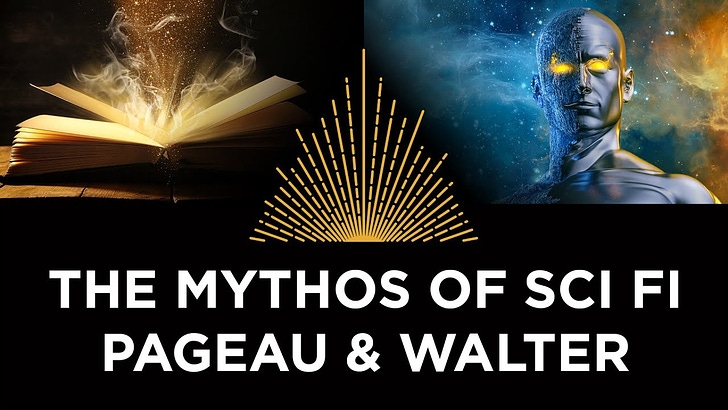Can Science Fiction Fill the Religious Void?
“Science fiction is essentially the attempt of science… to create a mythos for itself. Because science damaged the previous mythos, the Christian mythos, for most of Western society.” - Damien Walter
How do the stories we tell through science fiction reveal the deeper myths of the age we live in? And in a Silicon Valley future full of metaverses, neuralinks, and the Singularity, can science fiction play a role in restoring society’s central source of meaning?
In a new Rebel Wisdom dialogue, we bring together symbolism expert and long-time friend of the channel Jonathan Pageau with the writer and storyteller, Damien Walter, whose perspective on the mythos of Dune was one of our highlights from 2021.
Perhaps more than any other time in recent history, the last year has seen a ‘breach’ of sci-fi ideas into our everyday life.
We had pandemic and quarantine, concepts to which we had longstanding relationships through disaster, apocalypse and zombie movies; we had Mark Zuckerberg’s announcement of the ‘metaverse’, taken literally from a sci-fi book in Snow Crash by Neal Stephenson; we had billionaires blasting into space; and the development of SpaceX’s ‘StarLink’ satellite arm - a name both inspired by The Fault In Our Stars, and with seeming influence from the ‘SkyNet’ of Terminator lore.
What draws the ruling economic class to science fiction? While the Metaverse - and its weird, uncanny promotional video - may have been roundly mocked and deemed ‘dystopian’, the concept has its backers. Zuckerberg has pinned $10 billion to its development, in full knowledge that it will not be profitable "any time in the near future". The still more dystopian-sounding ‘Reality Labs’, the team behind Metaversal development, is being announced this week; a reported ‘investment craze’ has spurred WalMart and Microsoft to pile in on their own parallel realities.
That the idea is called ‘dystopian’ at all, though, is suggestive. It hints that concepts like Metaverses, and other memes and notions developed in science fiction literature, maintain a deep relationship with some of the oldest stories we tell ourselves about reality.
Also seen in transhumanist movements and books like Necromancer, the prospect of escaping the body and the limits of matter through a Metaverse is a direct extension from Gnosticism: a set of heretical Christian ideas that had a profound subterranean influence on the evolution of Western thought, occultism, and spirituality.
We could see the pull toward a ‘metaverse’ as a 21st century Gnosticism. Gnostic cosmologies are often defined by the idea that we need to escape the ‘fallen’ world and coming into a reunion with a spirit of extra-material pure consciousness at the heart of reality. And so while many see the metaverse as dystopian, for others it’s a passport to freedom and Utopia.
“It's the solution to our infinite desires, and it's the solution to our ecological problem. And it's [even] the solution to traffic”, Pageau says of Metaverse Utopianism. Indeed, if we believe we can endlessly and hyper-realistically iterate any kind of reality we want, it’s a short jump to a cessation of suffering itself - an idea that some Transhumanists have found appealing.
Utopian thinking of this kind isn’t anathema to science, Pageau points out - it was there at the birthplace of the Enlightenment. Figures like Voltaire imagined other planets populated by races that put humans to shame with their achievements. More generally, the dream of Modernism altogether was a gradual ‘march of history’, towards an imagined end goal where big-r Reason and Progress could predominate. In sci-fi, of course, these techno-utopian measures are led by singular, authoritative figures, often on heroic style journeys that mirror the arc of Christ.
“It's surprising that, as Christianity evacuated the public sphere, the story of Christ appears dimly everywhere”, Pageau says. “You start to notice that all those Marvel superheroes, all these characters that are willing to die for others, that all these characters that are willing to sacrifice themselves for others, they all end up being little Christ-like, in following that pattern.”
What’s more, John Vervaeke points out that the notion of a spiritually-vesselled linear history - the form of modernism and techno-utopian thinking - is not something we should take for granted - it was invented by the Ancient Hebrews. Animist and Brahminical understandings, for instance, viewed history instead in a circular way, wherein each of us plays a pre-set role that loops back endlessly through karmic forces.
But there’s something about the nature of sci-fi itself that has a mytho-poetic power - and one that mirrors the same power held by tradition and the ancient. The two are “connected, necessarily, you could say”, Pageau says, “almost because there's a relationship between the deep past and the far future. It’s just in the way that we experience reality in space that, the farther you go back in, the farther you go in front. The more the coherence breaks down and becomes a space for projection, it becomes like a canvas, or something that becomes potential for throwing meaning into.”
The relationship can be viewed almost as an ouroboros, the classic image of occult and religious tradition. The link of sci-fi to deeper storytelling traditions is evident even from the content as well as the form they held: Pageau points out that visions of aliens and extraterrestrials is a “cousin of mediaeval thinking”, which was populated with similar imagery and extended notions of “monsters on the borders of the world”.
Films like The Matrix strike a deep chord with us precisely because they point to these traditions and symbols. When released in 1999, it audiences in a culture before the ‘return of religion’ seen with 9/11 and the Christian Right - but also when utopian ideas about an internet-mediated ‘Gaian Mind’ were still in some vogue. It has a kind of “reverse Platonism” as its cosmology - the body, gunge, and goo are real, while the world of ideas is the illusion - The Matrix trojan-horsed a story with a lineage in the Vedas, Ancient Greece, Christianity and beyond.
Indeed, for Walter and Pageau, the ‘two-world’ metaphysic core to The Matrix also speaks to a broader conflict between Modernism and Postmodernism seen across our social structure, but also in sci-fi itself. Where Star Trek began as a utopian quest of discovery, for example, the series eventually absorbed “anti-colonialist ideas: the way that competent scientists and their technologies are actually kind of used to dominate the alien species that they are encountered within the mythos”, Walter points out.
“[O]ne of the things The Matrix forced people to do was to consider meaning and language as part of the manner in which we interact with reality”, Pageau says. “And it's something that is being kind of evacuated and there was something postmodern about it”, too - he raises the fact that the Wachowskis’ affirmation of the mutability of the self was something they drew from the matrix of their own film franchise. In this sense, Pageau also foresees an emerging trend of ‘hybrid’ forms in future sci-fi features - human and machine, man and animal, the latter of which has had a place in mythologies of many kinds (including the ‘dog-head’ St. Christopher, about whom Pageau has crowdfunded a graphic novel series).
But there are limits here. Pageau is worried by what he sees as a coming trend in film of ‘parasitical storytelling’, which seeks to “replace all the heroes, all the intellectual property from the past, with some version of woke culture”, where stories no longer ‘carve at the joints’ of our centres of symbolic meaning - rather, seeking to overturn them altogether, which he notes in such disparate examples as How To Train Your Dragon and even Kung-Fu Panda.
“I see a push in the other way as well”, Walter answers - “I see, and in my science fiction community and the fandom more broadly, this incredible hunger for traditional archetypal storytelling within this post-modern rewriting of the stories. People really want to come back to Aragorn as the king returning. You know, someone who is taking their hero's transformative saviour journey.”
Both view the process as parallel to “developmental stages”, in which our transition through modern and postmodern forms of storytelling will give rise to a greater “integration” of conscious reflection and connection. “I've always said that postmodernism is a way back into a kind of re-enchantment, because it understands the causality of language and the causality of meaning”, Pageau says.
Yet could even our best sci-fi stories provide new centres of meaning - or even balm the ‘meaning crisis’ glimpsed by John Vervaeke and others? A decided no, from both. “I feel the difficulty of science fiction is that it's mostly in… that kind of imaginary, dreamlike space, which is important, which is needed,” Pageau says. “But you also need that space to be connected to the bread and the water, the bread and the salt: that there's something which is sustaining and which holds your family together and holds things together.”
Walter agrees, noting that sci-fi, in some ways, has historically distanced us from more nourishing sources of symbol and meaning by propagandising for a stripped-down disenchantment by scientism. The genre “is essentially the attempt of the science, the error of science, to create a mythos for itself. Because science basically kind of damaged the previous mythos, the Christian mythos, for most of Western society.”
Look no further than Frankenstein, generally acknowledged to be science fiction’s first work, in which they reify the then-emerging materialism into a machinist approach to human identity. “If we're not a creation of God anymore, then we're basically a machine. And if we're a machine, then you can take bits of us and put us back together in a different way.”
But as Mary Shelley beautifully portrayed in that very first sci-fi story, the more we try to bypass our own humanity with technology, the more we’re forced to face it head on.
Our online course Sensemaking 101 begins again on February 10th. Join Daniel Schmachtenberger, Diane Musho Hamilton, John Vervaeke, Sara Ness and Rafia Morgan for a process that sees people from around the world making sense together in new ways. Read more and sign up here








